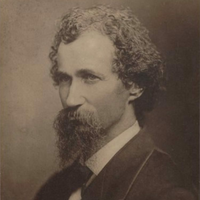Manasseh
Manasseh, lord of Judah, and the son
Of him who, favoured of Jehovah, saw
At midnight, when the skies were flushed with fire,
The splendid mystery of the shining air,
That flamed above the black Assyrian camps,
And breathed upon the evil hosts at rest,
And shed swift violent sleep into their eyes;
Manasseh, lord of Judah, when he came
To fortify himself upon his throne,
And saw great strength was gathered unto him,
Let slip satanic passions he had nursed
For years and years; and lo! the land that He
Who thundered on the Oriental Mount
Girt round with awful light, had set apart
For Jacob’s seed—the land that Moses strained
On Nebo’s topmost cone to see, grew black
Beneath the shadow of despotic Sin
That stalked on foot-ways dashed with human blood,
And mocked high Heaven by audacious fires;
And as when Storm, that voice of God, is loud
Within the mountained Syrian wilderness,
There flits a wailing through the wilted pines,
So in the city of the wicked king
A voice, like Abel’s crying from the ground,
Made sorrow of the broken evening winds,
And darkness of the fair young morning lights,
And silence in the homes of hunted men.
But in a time when grey-winged Autumn fogs
Shut off the sun from Carmel’s seaward side,
And fitful gusts did speak within the trees
Of rain beyond the waters, while the priests
In Hinnom’s echoing valley offered up
Unhallowed sacrifices unto gods
Of brass and stone, there came a trumpet’s voice
Along the bald, bleak northern flats; and then
A harnessed horseman, riding furiously,
Dashed down the ridge with an exceeding cry
Of “Esarhaddon, Esarhaddon! haste
Away, ye elders, lo, the swarthy foe
Six leagues from hence hath made the land a fire,
And all the dwellers of the hollowed hills
Are flying hitherwards before a flame
Of fifty thousand swords!” At this the men
Of Baal turned about, set face, and fled
Towards the thickets, where the impious king,
Ringed round by grey, gaunt wizards with the brand
Of Belial on their features, cowered low,
And hid himself amongst the tangled thorns
And shivered in a bitter seaborn wind,
And caught the whiteness of a deathly fear.
There where the ash-pale forest-leaves were touched
By Morning’s shining fingers, and the inland depths
Sent out rain-plenished voices west and south,
The steel-clad scouts of Esarhaddon came
And searched, and found Manasseh whom they bound
And dragged before the swart Assyrian king;
And Esarhaddon, scourge of Heaven, sent
To strange Evil at its chiefest fanes,
And so fulfil a dread divine decree,
Took Judah’s despot, fettered hand and foot,
And cast him bleeding on a dungeon floor
Hard by where swift Euphrates chafes his brink
And gleams from cataract to cataract,
And gives the gale a deep midwinter tone.
So fared Manasseh for the sins which brought
Pale-featured Desolation to the tents
Of alienated Judah; but one night,
When ninety moons of wild unrest had passed,
The humbled son of Hezekiah turned
Himself towards the wall, and prayed and wept;
And in an awful darkness face to face
With God, he said—“I know, O Lord of Hosts,
That Thou art wise and just and kind, and I
Am shapen in iniquity; but by
The years of black captivity, whose days
And nights have marked my spirit passing through
Fierce furnaces of suffering, and seen
It groping in blind shadows with a hope
To reach Thy Hand—by these, O Father, these
That brought the swift, sad silver to my head
Which should have come with Age—which came with Pain,
I pray Thee hear these supplications now,
And stoop and lift me from my low estate,
And lend me this once my dominionship,
So I may strive to live the bad Past down,
And lead henceforth a white and wholesome life,
And be thy contrite servant, Lord, indeed!”
The prayer was not in vain: for while the storm
Sang high above the dim Chaldean domes—
While, in the pines, the spirit of the rain
Sobbed fitfully, Jehovah’s angel came
And made a splendour of the dungeon walls,
And smote the bars, and led Manasseh forth
And caught him up, nor set him down again
Until the turrets of Jerusalem
Sprang white before the flying travellers
Against the congregated morning hills.
And he, the broken man made whole again,
Was faithful to his promise. Every day
Thereafter passing, bore upon its wings
Some shining record of his faultless life,
Some brightness of a high resolve fulfilled;
And in good time, when all the land had rest,
He found that he had lived the bad Past down,
And gave God praise, and with his fathers slept.
Thus ends the story of Manasseh. If
This verse should catch the eyes of one whose sin
Lies heavy on his soul; who finds himself
A shame-faced alien when he walks abroad,
A moping shadow when he sits at home;
Who has no human friends; who, day by day,
Is smitten down by icy level looks
From that cold Virtue which is merciless
Because it knoweth not what wrestling with
A fierce temptation means; if such a one
Should read my tale of Hezekiah’s son,
Let him take heart, and gather up his strength,
And step above men’s scorn, and find his way
By paths of fire, as brave Manasseh did,
Up to the white heights of a blameless life;
And it will come to pass that in the face
Of grey old enmities, whose partial eyes
Are blind to reformation, he will taste
A sweetness in his thoughts, and live his time
Arrayed with the efficient armour of
That noble power which grows of self-respect,
And makes a man a pillar in the world.

